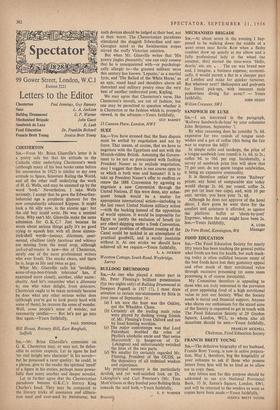SIR,—Mr. Brian Glanville's comments on G. K. Chesterton may, or
may not, be defen- sible in certain respects. Let us agree he had 'no real insight into character' in his novels— but he possessed a rarer quality : he could, in a phrase, give to the reader the spiritual 'smell' of a figure in his stories, perhaps more power- fully than many another and deeper novelist.
Let us further agree that the Chestertonian paradoxes became G.K.C.'s literary King Charles's head. They may be compared to the literary tricks of assonance and allitera- tion used and over-used by Swinburne; but such devices should be judged at their best, not at their worst. The Chestertonian paradoxes stimulated the sluggish Edwardian and neo- Georgian mind as the Swinburnian tropes stirred the stuffy Victorian emotion.
But when Mr. Glanville writes that 'His poetry jingles pleasantly,' one can only assume that he is unacquainted with—or psychologi- cally allergic to—the greatest militant verse this century has known. 'Lepanto,' as a martial lyric, and 'The Ballad of the White Horse,' as an epic, stand head and shoulders above all rhetorical and military poetry since the very best of another underrated poet, Kipling.
We may agree that Chesterton's verse, like Chesterton's morals, are out of fashion; but one may be permitted to question whether it is Chesterton or the fashion which is, properly viewed, in the advance.—Yours faithfully, GUY RAMSEY 13 Cannon Place, London, NW3


































 Previous page
Previous page